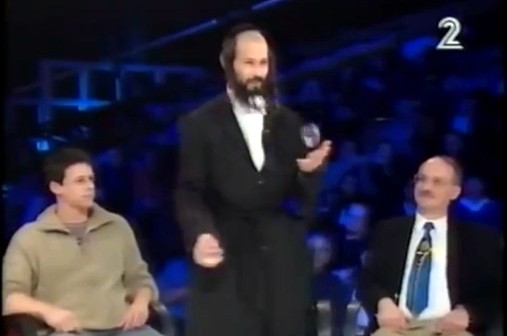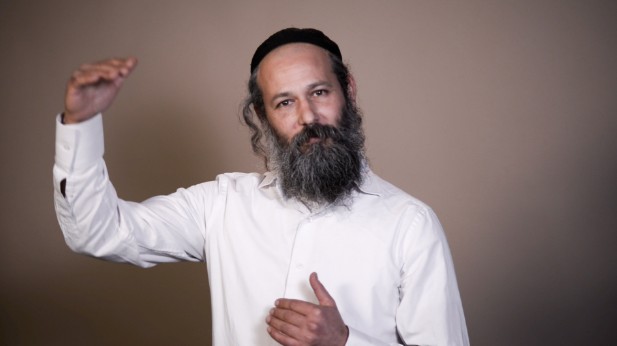The Juggling Chassid and the Circus Performer: Life According to Nitzan Hess
A video of a young Breslov Chassid juggling balls on Dan Shilon's show became a viral sensation about a month and a half ago. Fourteen years after it was filmed, juggler Nitzan Hess reveals: "I improvised the segment a few minutes before the broadcast." An interview.

Nitzan Hess constantly asks himself questions. Even today, 18 years after turning to Judaism, he continues his journey inward. A journey we, the viewers, caught a glimpse of during a performance he improvised minutes before taking to the hottest prime-time stage on Channel 2, 14 years ago. About a month and a half ago, on Chanukah, a clip from Dan Shilon's program was shared, and over 400,000 people worldwide watched it. What hypnotized them about the young Breslov Chassid juggling balls and summarizing the Torah in a single sentence? And more broadly, who spread his clip so frantically?
"You can't begin this journey in the world until you genuinely try to give up on capturing the whole world..." says Hess to the stunned viewers, "until you truly understand that everything here is ups and downs," he continues while juggling the balls, "until you realize that basically, we know nothing. The journey into the essence of things doesn't start until you're willing to be like a small child who says: 'Father, I lost it.' And then, willing to bend down and start again, from scratch. This journey doesn't begin until you're ready to work from love, and that's actually the entire Torah on one leg."
This short video, only two minutes and 13 seconds long, inspired a young man from Bnei Brak feeling disheartened. He received it from a friend, felt strengthened, and decided to share it further. Overnight, it became a viral hit. Hess, a juggler with a respectable amount of experience, knows that the one truly pulling the strings is Hashem.
Hess (44), a resident of Hadera and father of eight children, is now a scholar in the morning and juggler in the evening, running with the show 'The Tale of the Lost Princess' based on a tale by Rabbi Nachman. His journey to Judaism essentially began since he was a child. "Life led me to Judaism," he says, "since I was a child, I questioned what we're doing here? I wanted to know what is primary and what is secondary. Even today, as an artist, I ask myself: what do I have to say to the audience? Who allowed me to take an hour of their time? Every artist must go through this clarification and answer themselves—what am I saying to my audience, and how much do I stand behind it."
What was your childhood like?
"I was born in Ra'anana in a loving and happy home, which had no connection to Torah and mitzvot, even though my grandfather, of blessed memory, studied in a yeshiva until age 26. My father was a senior pilot in the Air Force and later became an air accident investigator in the Ministry of Transportation. My mother was a teacher, later a principal, and a director of an adult education center. Both are very supportive parents. They supported me throughout my journey, in all choices I made. My brother is a Ph.D. in physics, my sister works in music therapy, and I am the third child in a 'northern' family."
What kind of child were you?
"I was quite an ordinary child; there wasn't anything unusual or different about me, but I had a hunger for something beyond. From a young age, I acquired various skills. I always loved learning techniques. I surfed, engaged with model airplanes, rode horses, learned shooting with a pellet rifle; in hindsight, I understand that I was constantly trying to be more accurate. I was always searching for the path, but I was disappointed."
 Hess on Dan Shilon
Hess on Dan ShilonWhy exactly?
"Because as much as I acquired more skills, I remained limited in this world. While I was good at things, it didn't lead to anything, and it created in me a hunger for the next thing, something beyond what exists. In high school, I went to the acting school in Ramat Hasharon and enrolled in a theater program. Shortly after, we traveled to the Acre Theater Festival, and I was first exposed to the circus. I saw someone performing circus acts, and it attracted me, even though it never intrigued me before. When I saw it, I wanted to understand the skill. I tried to juggle balls like he did, but I failed. I tried again, and predictably, I failed. I gave up, but something inside me pushed to continue training. Eventually, I started working in the field and later began performing and earning some money from it, so I continued."
What did your parents say?
"My parents supported me. When they saw I was managing the part and happy, that was enough for them. Besides, I earned some money as a teenager, so what was wrong with that? I performed in Israel after school, and in parallel, I began learning modern dance techniques, mime, martial arts, and more. At a young age, I built a broad career, yet the more successful I was, as the performance was better, the more emptiness I felt. I constantly heard the voice asking: so what now? What next?"
Hess, alongside press photographer Ziv Koren, formed the duo "Field Juggle," and the two toured the country with performances. As success smiled upon him, the inner voice nagged at him: Where is all this going? At 18, he enlisted in the IDF Theater, and after his military service, he flew to Europe. "I realized something in this life was missing, but it didn't stop me as job offers continued. I performed at an event that gained wide media coverage and then received calls from producers, and my career soared even higher."
Hess made a lot of money, gained media exposure, but remained with emptiness and questions. "Contracts were signed with me, I earned money, but what I was doing on stage didn't suit me. I sat home and said to myself I'm heading to a place that's not good. I felt it wasn't me. I called the producer and told him I was flying abroad. Something inside me knew I didn't know the right path, but I felt I didn't want to waste my life. I knew what I didn't want to do, but not what I did want to do."
Was Judaism an option for you?
There wasn't a special connection to Judaism until I seriously injured my back at the age of 24. At this stage, I began to see I was living under supervision, that nothing happens by chance, on its own. I stopped performing and began to take care of myself. Gradually I began connecting to Judaism and at age 26, I entered a yeshiva in Jerusalem and left the stage."
 Nitzan Hess
Nitzan HessHow did Judaism suddenly become an option?
It didn't happen "suddenly," it was a process. I grew up in a world that called for freeing from the fixed ideas and anything considered conventional. During the process I went through, I understood with myself that okay, so I broke free from everything, and what remained? I understood there is a purpose beyond."
Today, Hess is establishing a masterclass for anyone interested in experiencing theater and art. He performs with the show "The Tale of the Lost Princess," studies Torah in the morning, and functions as a father to eight children.
Is there a contradiction between art and Judaism, in your opinion?
"Not at all. Judaism itself has a lot of art. For example, there was a time when I was teaching, and as a Rebbi, you have to convey stories to children and engage and captivate them. Meaning you have to use theatrical skills to successfully teach them Torah. Creativity is part of Judaism, I don't see a contradiction between the two."
Are you a happy person these days?
What is happiness? To receive approval. Everyone wants a good word and positive feedback. The word "happy" suggests there is someone approving of me. A truly happy person is one who receives approval from their Creator, who is the one approving of them. So in that sense, yes, I am happy. However, I believe that inner joy is a life-long job that continues every day, and it has its ups and downs."

